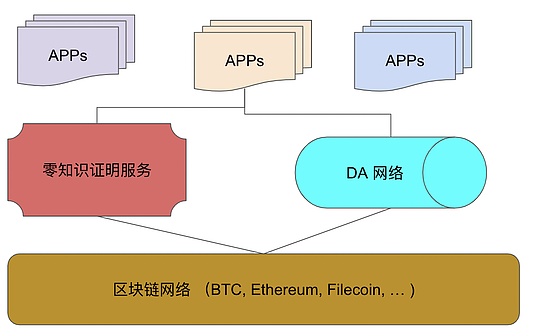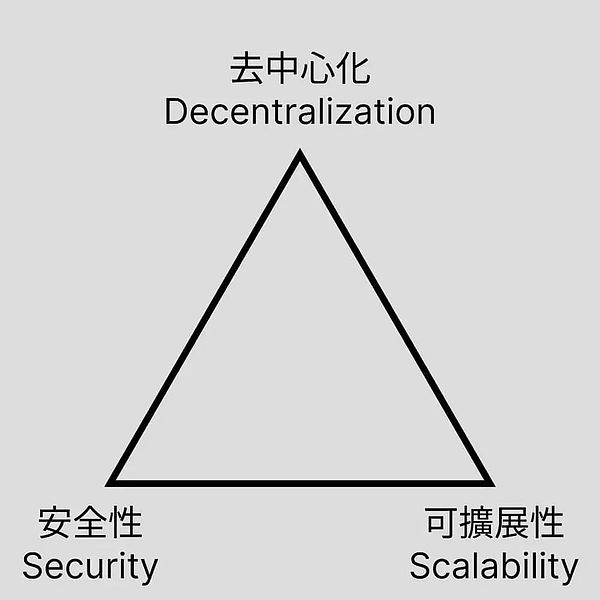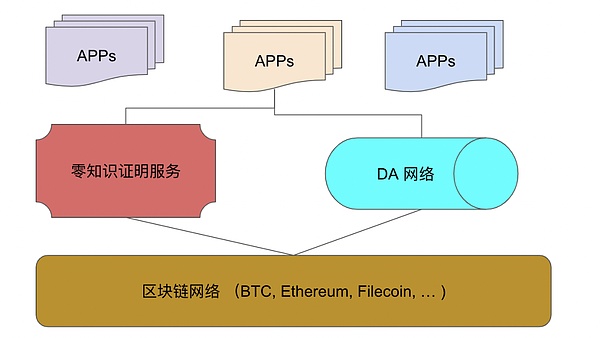
Zero-knowledge proof will be one of the most basic technologies of Web3, and most projects will be related to zero-knowledge proof.That is to say, zero-knowledge proof will have a profound impact and penetrate into every corner of Web3.
Keep a photo here!(At the end of this, look back in two years)
Let me first talk about what Web3 is.Simply put, Web3 is the decentralized Internet (Decentralized Web).If you don’t talk about decentralization, just talk about Web3.
The premise of impossible triangle
When it comes to decentralization, blockchain is indispensable.Speaking of blockchain, it is impossible to escape the blockchain impossible triangle.In other words, decentralization, scalability and security cannot be obtained at the same time.

But there is a prerequisite for this, that is, under certain technical conditions.Under certain technical conditions, if one aspect or two aspects is to be improved, other aspects will inevitably be sacrificed..For example, many current projects claim to be able to achieve TPS reaching thousands and hundreds of thousands.Nothing else, just sacrificing security and decentralization.Therefore, this type of project does not have a strong security base, and it is even more outrageous. In fact, the Internet project has approved a Web3 sheepskin.It’s just like selling dog meat with sheep’s head.
What if technology advances?
However, it is not impossible to have both of them, and this requires technological progress to achieve it.When technology makes breakthroughs, overall improvements can be achieved.To give a brief example, if computing power and network speed are improved, TPS can be improved without sacrificing security and decentralization.
Technological progress may lead to unilateral breakthroughs or all-round breakthroughs.For example, the development of storage proofs allows PoC consensus to achieve similar security in PoW consensus, so blockchains may not need to use energy-consuming methods to provide decentralized basic trust.The development and wide application of Byzantine consensus have enabled some scenarios where security requirements are not particularly high, to provide a downgrade security basis based on PoS.The development and advancement of cryptography have enabled transaction security to be strengthened, and security and ease of use may be taken into account.The development of zero-knowledge proof may provide all-round breakthroughs, that is, it can provide all-round assistance to decentralization, security and scalability.
What is zero-knowledge proof?
Simply put, zero-knowledge proof is a cryptographic method that allows one party (proverifier) to prove to the other party (verifier) that some information is true without providing any additional information.
It’s too abstract to put it simply, here are two aspects:
1. Proof: It is to use a proof string (a fixed-length class random number) to prove something, which can be a piece of stored data, a completed calculation, etc.;
2. Zero knowledge: that is, you have proved that relevant information will not be leaked; you have proved that the calculation has been done, but the specific calculation information and input data will not be disclosed.
It’s still too abstract. Let’s talk about it specifically: For example, if you have stored a piece of data on Baidu Netdisk, how do you know that Baidu Netdisk has not lost or tampered with your data?You don’t know, unless you download it and make a comparison, it’s troublesome, so you simply choose to believe it and if something really goes wrong, just sue it later.
For example, you rented a virtual machine on Alibaba Cloud to execute a program.How do you know that the execution result of this program is correct?You’re just assuming it’s right.What you are thinking is, why did Alibaba Cloud lie to me that hard?So you believe it.But there is no guarantee or proof here.
However, if technology advances, Baidu Netdisk or Alibaba Cloud computing platform can provide you with a proof that you can easily verify after each storage or calculation, and a mathematically strict proof.You don’t choose to simply believe, you can choose to verify.This is especially important in decentralized networks, remember:Don’t Trust, Verify!
If these proofs are publicly verifiable, that is, anyone including you can verify it without exposing privacy, then it is perfect.This is zero-knowledge proof.
Why is zero-knowledge proof everywhere
Let’s first take a look at why Baidu Netdisk or Alibaba Cloud does not provide such proof?The reason is simple. Zero-knowledge proof is a new technology that is not yet mature despite its rapid development.The cost of use is still very high.Simply put, generating proofs is much more expensive than doing it again. It is a difference of orders of magnitude, so it is not practical.
However, this situation is slightly different in decentralized networks.First, decentralized networks are very expensive, such as Ethereum computing, you will know just by looking at the Gas fee.This is so expensive because each node has to do the same calculation repeatedly, so the cost is thousands of times that of centralized calculations.And if we can calculate off-chain and submit the proof directly to the chain, then the calculation only needs to be guaranteed to be safe.This is the theoretical basis of zkRollup.Most zkRollup’s calculations are centralized, but their calculations are submitted to a decentralized network for verification, which borrows the security of Layer 1, and the network is expanded through hierarchy.In other words, the network has expanded, but the security has not been weakened, and the decentralized dock is still the same.
It is not just zkRollup that can leverage the Ethereum Layer 1’s security base with zero-knowledge proof.We can also directly innovate Layer 1. With zero-knowledge proof, we don’t seem to need to do repeated calculations in Layer 1, we just need decentralized verification.Depreciation leads to zkVM. For example, Aleo is a new emerging blockchain network that uses zero-knowledge proof to perform off-chain computing and on-chain verification. Its security is guaranteed by a large number of verification nodes.
So, since zkRollup can extend Layer 1 through zero-knowledge proof, are other applications also OK?sure.This is why many applications now run a Layer 2 directly, submit the proof directly to the main chain to borrow security, and realize decentralized trust.In this way, a large number of Web2 applications can be grafted into a secure blockchain network, and can be directly connected to BTC, Ethereum, or Filecoin.
With zero-knowledge proof as the basis, there is a chance to transfer Web2 applications to Web3.A possible Web3 architecture is:
-
There are some blockchain networks that are sufficiently decentralized. The consensus they use is mainly PoW or PoC, or PoS networks that already have a strong ecological ecosystem. They establish decentralized network trust and are the security basis of Web3;
-
The service layer of zero-knowledge proof, used to provide zero-knowledge proof services, link applications and secure blockchain networks;
-
Decentralized storage network, build a DA layer, and use zero-knowledge proof technology to ensure privacy and data security;
-
Various applications, their computing adopts centralized, builds proof through the zero-knowledge proof service layer, and verifies through the blockchain network to ensure correctness and integrity; data storage adopts a decentralized storage network, which also uses zero-knowledgeProof to ensure correctness and integrity.

How long will it take to wait?
Someone is asking, it seems that the current Web3 application is not like this?That’s right, it’s not the case. Web3 is still a seedling, and it’s just the beginning.
From the application level, the current Web3 either puts the contract in Layer 1 and relies on repeated calculations to provide security, or it just puts the tokens in the contract and disguises it as Web3 (no decentralized security guarantee).A welcome trend is that many Web3 projects can be run in Rollup, so that Layer 1 can be used to provide security through the OP or ZK method.However, we can see that Web3 is still very niche and is mainly finance (DeFi). After talking about GameFi for several years, SocialFi is also constantly trying.
Just imagine, without decentralized storage (enough decentralized DA network), data cannot be decentralized, and applications with large amounts of data interaction cannot be used in Web3.In addition, zero-knowledge proof technology has only proved feasibility in theory, and its efficiency and cost-effectiveness need to be greatly improved in terms of engineering and methods.These two parts are the key to the future development of Web3.When substantial breakthroughs are made in both aspects, the entire decentralized era of the Internet will come, and the Web3 era will come.By that time, whether it is Baidu Cloud or Alibaba Cloud, it is necessary to prove that its services can be verified through a decentralized trust network. Otherwise, there will naturally be a new application paradigm to adapt to this demand.
I don’t know how long it will take to wait.But the trend is clear.Don’t have too high expectations for the short-term, and don’t underestimate the power of long-term gradual development. Perhaps the singularity is in the next cycle.








